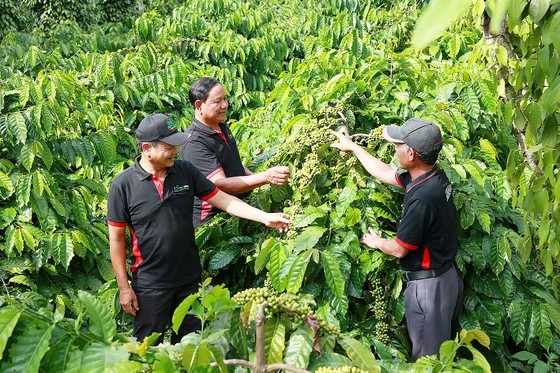
Many domestic enterprises are actively applying the models of circular economy and green economy to adapt to climate change. They are using environmentally friendly technologies in manufacturing to reduce greenhouse gas emission for a more sustainable development. This brings various benefits not only to the businesses themselves but also to the community.
For instance, Nestlé Vietnam is cooperating with the Ministry of Agriculture and Rural Development, the Central Highlands Agro-Forestry Science and Technology Institute to support coffee farmers from selecting suitable seeds to farming practices under international standards. As a result, 40 percent of irrigation water and 20 percent of artificial fertilizer, pesticide have been reduced, greatly improving the health of farmers and the carbon sequestration rate as well as increasing the local biodiversity.
Using the circular coffee production model, Nestlé Vietnam has decreased 12,679 tonnes of CO2 a year on average via the use of biomass energy harnessed from coffee grounds to replace 74.4 percent of DO fuel. The switch from plastic to paper straws also reduces 700 tonnes of plastic waste a year in Vietnam.
For a sustainable growth, Vietnam Dairy Products JSC. (Vinamilk) has been launching synchronous measures of organic farming, greenhouse gas monitoring under the ISO 14064 standards to manage carbon footprint, livestock raising under the European Organic and Global GAP standards, biomass and solar energy use, anaerobic technology for waste treatment, methane recycling to heat water for cow bathing. These practical solutions have saved nearly 171kWh of electricity and 86,000m3 of water, 100kg of fuel a year while reducing the use of 980kg chemicals per year.
Mark Birnbaum, Director of the Vietnamese Private Sector Competitiveness Enhancement Project (the US Agency for International Development – USAID), commented that the ways businesses interact with their local communities and environment can affect their market access, and in turn, their success. Sustainable business practices do not merely limit in environmental issues but also relate to human, system, and resource matters. Those companies actively investing in green development always consider their impacts on the local community, and thus being able to achieve a consistent growth as well as a stronger resilience.
Therefore, USAID has worked with the Ministry of Planning and Investment to launch the ‘Initiatives to Promote the Application of an Environmental, Social, and Governance Framework (ESG) in the Private Sector for Sustainable Growth in the 2023-2025 Period’.
The initiative will be completed via the project ‘Private Sector Competitiveness Enhancement’, with a total capital of US$36 million sponsored by USAID. It will focus on improving legal frameworks to promote the ESG practice and capacity for 100,000 small domestic enterprises, while supporting another 300 companies regarding technical aspects. These are expected to answer the demands of key export markets for a sustainable development.
Director Birnbaum said that the boost of ESG method implementation will create excellent ideas, models, typical successes, in hope of spreading the usefulness of this method to other companies for a more sustainable economy.
Deputy Minister of Planning and Investment Tran Quoc Phuong commented that climate change has been affecting all nations in the world, including Vietnam. The new consumption trend has asked manufacturers to prioritize green sustainable production. Domestic companies must renovate themselves to follow the trend; otherwise, their competitiveness will pitifully decrease, and they cannot enter the global value chain.
Hence, the Planning and Investment Ministry has actively consulted the Government to introduce new mechanisms, policies to aid businesses to switch to more sustainable models that ensure a harmonious combination between economic efficiency and social responsibilities, environment protection, natural resources conservation. It is these models that help to fulfill the 17 goals of sustainable development of Vietnam by 2030.
All actions, directions, and goals introduced by the Government have been institutionalized in formal documents like the National Strategy on Green Growth in the 2021-2030 Period with a Vision to 2050, the Plan for Sustainable Development of the Private Sector until 2025 with a Vision to 2030, the Program to Support Sustainable Businesses in the 2022-2025 Period.
























